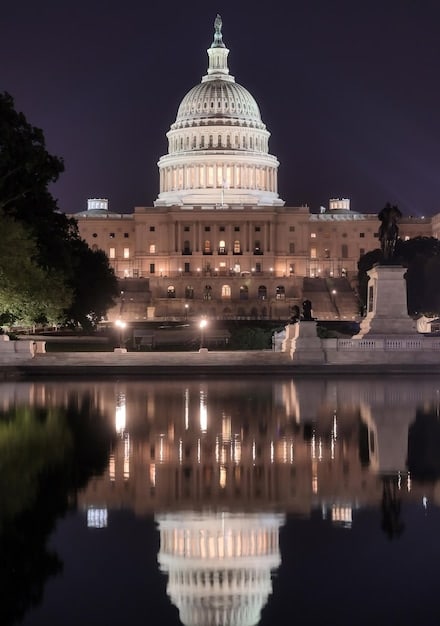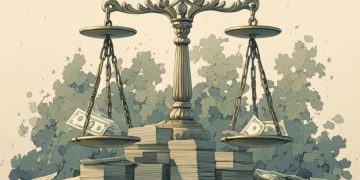Understanding Tech Regulation in the US & Its Impact on Innovation

How Does the US Government Regulate the Tech Industry, and What are the Potential Impacts on Innovation? The U.S. government regulates the tech industry through antitrust laws, data privacy regulations, and sector-specific legislation, aiming to foster competition and protect consumers while potentially influencing the pace and direction of technological advancements.
The tech industry in the United States is a powerhouse of innovation, constantly pushing boundaries and reshaping our world. But with great power comes great responsibility, and the US government plays a crucial role in overseeing this dynamic sector. How Does the US Government Regulate the Tech Industry, and What are the Potential Impacts on Innovation? This is a question that sparks intense debate, with stakeholders from Silicon Valley to Washington D.C. holding strong opinions.
Understanding the intricacies of tech regulation is essential for anyone interested in the future of technology and its role in our society. From antitrust laws designed to promote competition to data privacy regulations aimed at protecting consumers, the government’s involvement is multifaceted and constantly evolving. Let’s delve into the key aspects of this complex landscape and explore the potential consequences for innovation.
The Landscape of Tech Regulation in the US
The United States government employs a variety of tools and strategies to regulate the tech industry. These regulations are designed to address a range of issues, including promoting competition, protecting consumer privacy, and ensuring national security. Understanding the different types of regulations and the agencies responsible for enforcing them is crucial for navigating this complex landscape. The question remains: How Does the US Government Regulate the Tech Industry, and What are the Potential Impacts on Innovation?
Antitrust Laws and Competition
Antitrust laws are a cornerstone of tech regulation in the US. These laws, such as the Sherman Act and the Clayton Act, are designed to prevent monopolies and promote competition. The Federal Trade Commission (FTC) and the Department of Justice (DOJ) are the primary agencies responsible for enforcing antitrust laws. They investigate mergers, acquisitions, and other business practices that could harm competition.
Data Privacy Regulations
Data privacy is another major area of concern for regulators. In the absence of a comprehensive federal privacy law, the US relies on a patchwork of state laws and sector-specific regulations. The California Consumer Privacy Act (CCPA) is one of the most prominent state laws, giving consumers greater control over their personal data. The Children’s Online Privacy Protection Act (COPPA) is a federal law that protects the online privacy of children under 13.
- FTC’s Role: The FTC also plays a key role in enforcing data privacy regulations. It has the authority to take action against companies that engage in unfair or deceptive practices related to data collection, use, and sharing.
- EU’s Influence: The European Union’s General Data Protection Regulation (GDPR) has also influenced the debate on data privacy in the US, prompting calls for a federal privacy law that would provide stronger protections for consumers.
- Ongoing Debate: The debate over data privacy continues to evolve, with ongoing discussions about issues such as data security, data breach notification, and the use of artificial intelligence.
Ultimately, the impact of government regulation on the tech industry is a complex issue with many different perspectives. How Does the US Government Regulate the Tech Industry, and What are the Potential Impacts on Innovation? This question remains pertinent as the regulatory landscape evolves alongside technological advancements.
Key Regulatory Bodies Overseeing the Tech Sector
Several government agencies play essential roles in overseeing and regulating the tech sector in the United States. Each agency has specific responsibilities and jurisdictions, contributing to a multi-layered regulatory environment. Understanding these key players helps clarify How Does the US Government Regulate the Tech Industry, and What are the Potential Impacts on Innovation?
The Federal Trade Commission (FTC)
The FTC is a primary regulator of the tech industry, focusing on promoting competition and protecting consumers. The agency investigates and prosecutes companies engaging in anti-competitive practices, deceptive advertising, and unfair data collection methods.
The Department of Justice (DOJ)
The DOJ’s Antitrust Division shares responsibility with the FTC for enforcing antitrust laws. The DOJ often handles larger, more complex antitrust cases. They work to prevent monopolies and ensure fair market competition, impacting how the US government regulate the tech industry.

- Federal Communications Commission (FCC): The FCC regulates communications technologies, including broadband, internet service providers, and telecommunications companies.
- Securities and Exchange Commission (SEC): The SEC oversees financial markets and ensures fair trading practices, regulating how tech companies raise capital and interact with investors.
- National Institute of Standards and Technology (NIST): NIST, part of the Department of Commerce, develops standards and best practices for cybersecurity and technology innovation, influencing industry practices and government policy related to how the US government regulate the tech industry.
These regulatory bodies work in tandem, creating a system of checks and balances designed to promote innovation while safeguarding consumer interests and ensuring fair economic practices. The specific approach of each agency contributes significantly to How Does the US Government Regulate the Tech Industry, and What are the Potential Impacts on Innovation?
The Debate Around Antitrust Enforcement in Tech
Antitrust enforcement in the tech industry has become a particularly contentious issue, with ongoing debates about the appropriate scope and intensity of government intervention. Concerns about the dominance of a few large companies, such as Google, Amazon, and Facebook (now Meta) have fueled calls for more aggressive antitrust action. But how does the US government regulate the tech industry through antitrust laws?
Arguments for Stronger Enforcement
Proponents of stronger antitrust enforcement argue that the current level of market concentration in the tech industry stifles innovation, reduces consumer choice, and harms smaller competitors. They point to the ability of dominant platforms to acquire potential rivals, leverage their market power into adjacent markets, and control access to essential infrastructure as evidence of anti-competitive behavior.
Arguments Against Overregulation
Critics of stronger antitrust enforcement argue that heavy-handed regulation could stifle innovation, harm consumers, and make US companies less competitive in the global market. They argue that the tech industry is dynamic and constantly evolving, and that attempts to regulate it too aggressively could have unintended consequences. They raise the question of how does the US government regulate the tech industry without hindering innovation?

The debate over antitrust enforcement is likely to continue for years to come, as policymakers grapple with the challenges of regulating a rapidly evolving industry. The ultimate outcome will have a significant impact on the future of the tech sector, and on how the US government regulates the tech industry.
Privacy Regulations and Data Protection
Privacy regulations are a critical component of tech industry oversight in the United States. With the increasing volume of personal data collected and processed by tech companies, concerns about data protection have grown exponentially. The discussion centers on how does the US government regulate the tech industry to safeguard user privacy.
Current State of Privacy Laws
Currently, the US lacks a comprehensive federal privacy law similar to Europe’s GDPR. Instead, it relies on a patchwork of federal and state laws that address specific aspects of data privacy. Sector-specific laws like HIPAA (health information) and COPPA (children’s online privacy) address particular types of data. State laws, such as the California Consumer Privacy Act (CCPA), provide broader consumer rights.
The Push for Federal Legislation
There is growing momentum for a federal privacy law that would establish a national standard for data protection. Supporters argue that a federal law would provide greater clarity and consistency for businesses, while also ensuring stronger protections for consumers. This legislative debate centers on how does the US government regulate the tech industry on a national level?
- Consumer Rights: Stronger regulations could empower consumers with greater control over their personal data, including the right to access, correct, and delete their information.
- Industry Standards: Federal legislation could create standardized industry practices for data security, breach notification, and data minimization.
- Innovation Impact: Concerns remain about how stringent privacy regulations might impact innovation. Some argue that excessive regulation could hinder the development of new technologies.
The balance between protecting privacy and promoting innovation remains a focal point in discussions surrounding How Does the US Government Regulate the Tech Industry, and What are the Potential Impacts on Innovation? Achieving this balance is vital for fostering a healthy tech ecosystem.
The Impact of Regulation on Innovation
The fundamental question at the heart of the debate over tech regulation is its impact on innovation. How Does the US Government Regulate the Tech Industry, and What are the Potential Impacts on Innovation? Different stakeholders hold vastly different views on this issue.
Potential Benefits of Regulation for Innovation
Some argue that regulation can actually foster innovation by creating a more level playing field for smaller companies and startups. By preventing dominant platforms from engaging in anti-competitive behavior, regulation can encourage new entrants to enter the market and challenge the status quo. Data privacy regulations can also encourage companies to develop more privacy-friendly technologies and business models. Understanding how the US government regulate the tech industry helps in analyzing these dynamic interactions.
Potential Drawbacks of Regulation for Innovation
Others argue that regulation can stifle innovation by increasing compliance costs, creating uncertainty, and discouraging risk-taking. They argue that the tech industry is characterized by rapid change and experimentation, and that heavy-handed regulation can slow down the pace of innovation. They are concerned about how does the US government regulate the tech industry without unintended consequences.
Ultimately, the impact of regulation on innovation is likely to depend on the specific type of regulation, the way it is implemented, and the broader economic and technological context. Policymakers need to carefully consider the potential benefits and drawbacks of regulation when making decisions about How Does the US Government Regulate the Tech Industry, and What are the Potential Impacts on Innovation?
Navigating the Future of Tech Regulation
The future of tech regulation in the US is uncertain, but it is clear that the debate over the appropriate role of government in overseeing the tech industry will continue to be a central topic of discussion. In conclusion, one must ask: How Does the US Government Regulate the Tech Industry, and What are the Potential Impacts on Innovation?
Key Considerations for Policymakers
As policymakers grapple with the challenges of regulating the tech industry, they need to consider a number of key issues. These include the need to promote competition, protect consumer privacy, ensure national security, and foster innovation. They also need to consider the global context, and the implications of US regulation for the competitiveness of American companies in the international market. Furthermore, understanding how the US government regulate the tech industry requires foresight.
The Role of Stakeholders
The future of tech regulation will also depend on the active engagement of all stakeholders, including tech companies, consumer groups, civil society organizations, and academics. By working together, these stakeholders can help to shape a regulatory framework that promotes innovation, protects consumers, and ensures a fair and competitive marketplace. Exploring How Does the US Government Regulate the Tech Industry, and What are the Potential Impacts on Innovation? requires collective effort.
| Key Aspect | Brief Description |
|---|---|
| ⚖️ Antitrust Laws | Prevent monopolies & promote competition in tech. |
| 🛡️ Data Privacy | Aims to protect consumer data through laws like CCPA. |
| 🏢 Regulatory Bodies | FTC, DOJ, FCC oversee tech industry practices. |
| 💡Innovation Impact | Regulation can either foster or hinder tech innovation. |
Frequently Asked Questions
The primary antitrust laws include the Sherman Act and the Clayton Act, which aim to prevent monopolistic practices and promote fair competition in industries, including the tech sector. These are critical to how the US government regulate the tech industry.
The California Consumer Privacy Act (CCPA) gives consumers the right to know what personal data is collected about them, the right to delete their personal information, and the right to opt-out of the sale of their personal information.
The FTC investigates and prosecutes companies that engage in anti-competitive practices, deceptive advertising, and unfair data collection methods. Their activities directly influence How Does the US Government Regulate the Tech Industry, and What are the Potential Impacts on Innovation?.
The debate centers on the need for a national standard for data protection versus the potential for overregulation that could stifle innovation. A consistent federal law could offer clearer guidelines and stronger consumer rights.
While some argue that regulation fosters innovation by leveling the playing field, others claim it can hinder innovation by increasing costs and uncertainty. The optimal balance is key in determining How Does the US Government Regulate the Tech Industry, and What are the Potential Impacts on Innovation?.
Conclusion
In conclusion, the regulation of the tech industry in the United States is a complex and evolving landscape. Understanding How Does the US Government Regulate the Tech Industry, and What are the Potential Impacts on Innovation? requires careful consideration of antitrust enforcement, data privacy measures, and the roles of key regulatory bodies.
As technology continues to advance, policymakers and stakeholders must collaborate to create a regulatory framework that promotes innovation, protects consumers, and ensures a fair and competitive marketplace. Staying informed and adaptable will be essential for navigating the future of tech regulation.





